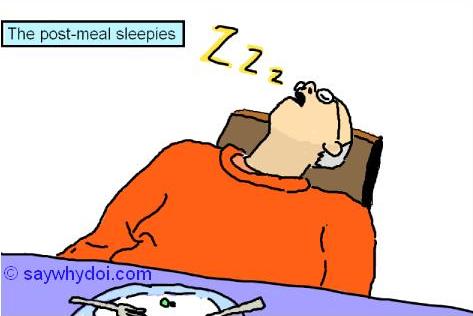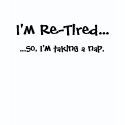Most of us are familiar with that sleepiness that falls upon us after eating a really big satisfying meal. The “food coma effect” is most prevalent after massive meals, like after Christmas dinner or the Thanksgiving meal.
What you’re suffering from is post-postprandial somnolence, or as we like to call them in my househould, the post-meal sleepies.
But why do we feel tired after eating? Here are 6 reasons why and what you can do about it.
1. First rule out relaxation
I know this sounds a bit funny but believe it or not, some people misinterpret feeling relaxed with feeling low in energy. I say this because digestion of food triggers our “rest and digest” nervous system response (also known as the parasympathetic nervous system response). As the name suggests, it is linked with resting and feeling relaxed.
Having said this, a lot of people really do feel fatigued after a meal, and that could be for one of several reasons given below.
2. It could be because your energy and blood are directed to your gut and not to your brain
After you eat a large meal of solid foods, blood flow is diverted to the gut to provide it with the resources it needs to digest your meal. This means that there is reduced blood flow elsewhere, like to your brain, which can make you feel drowsy.
In Chinese Medicine they refer to this phenomenon as Qi being diverted away from the brain, to the Stomach and Spleen (the Spleen being not our Western idea of a spleen, but a different organ which is considered as the main organ of digestion in Chinese Medicine).
Not only is blood diverted to the gut, but also energy is used up in the process of digestion.
Certain things make you prone to using up more energy to digest your food, thus making you more tired:
- Deficiencies: If you’ve got certain deficiencies of stomach acid, digestive enzymes or nutrients, your body needs to work even harder in order to break down the food, and this uses up more energy. Not only this, but poor digestion means that large particles enter places of your digestive tract where they shouldn’t be, abrading the walls of your lower intestinal tract. This causes an internal stress on the body which further uses up energy.
- Eating hard-to-digest foods: Things like raw and cold food need more energy to digest than cooked, warm food. This is why people on raw food diets may suddenly feel *more* tired rather than more energized. Raw food diets are only appropriate for people with very good, strong digestion that can handle hard-to-digest raw foods.
- Eating a very large meal: If you eat a large meal, it’s a lot to digest all at once, so understandably this is harder work and demands more blood diversion to the gut. It also uses up more energy than digesting a small meal.
- Low energy levels in general: If you’re already running low on energy for other reasons, using up more energy in digestion can make you feel even more tired.
- Spleen Qi Deficiency: In Chinese Medicine, Spleen Qi deficiency is a common cause of poor digestion.
What can I do about this?
- Chew your food well: This makes your body work less hard on digestion further down the digestive tract.
- Ensure you have a good nutrient status. A good multivitamin is a great way to maintain a healthy nutrient status. My favourite multivitamin/mineral complexes are: Solgar – Female Multiple, 120 tablets (click here for US visitors)
( click here for UK visitors) which is great for women, or Nature’s Plus – Source Of Life Liquid (US)
(UK) which is the better absorbed since it’s in liquid form, and is fantastic for both men and women.
(NB Both these multis contain iodine so should not be given to someone with hyperthyroidism and should be avoided by people with a family history of autoimmune disease).
I’d recommend visiting a nutritionist to assess your nutritional status. You could also send yourself for diagnostic tests (blood tests) to ascertain your nutrient level. - Ensure you have good production of stomach acid and digestive enzymes. You can do this by:
- - Ensuring you have topped up all your nutrients, because certain nutrients are required in order for your body to produce stomach acid and digestive enzymes. Zinc (40-45mg a day) is particularly important for stomach acid production. A good zinc supplement is Solgar – Zinc Picolinate (Dose: x2/day) (US)
(UK)
- – Ensure you eat in a relaxed environment. The reason for this is that if there is a stressful environment (eg arguments at the table, eating in front of a gripping TV show), your body thinks it has to prepare for fight or flight mode, and as a result, it diverts energy away from your digestive system, and to organs needed to escape, like to your muscles. With less energy given to digestion, stomach acid and digestive enzyme production is reduced.
- – Having a glass of water with about 1 tsp apple cider vinegar in it (like Organic Raw Apple Cider Vinegar (US)
(UK). This can help top up your stomach acid levels if they are low. Although this can be helpful as a temporary treatment, in my opinion it’s best to treat at the root of the problem by encouraging your body make its own stomach acid, by ensuring it has all the nutrients it needs to make stomach acid, rather than topping it up with vinegar in the long-term. The apple cider vinegar could be a temporary solution though.
- Go for easy-to-digest cooked foods and warm foods and avoid hard-to-digest raw, cold foods. This is only good advice for someone who has sluggish digestion. There isn’t a “one-size-fits-all” advice. We’re all individuals.
- Eat small meals, often rather than 3 large meals. This is easier to digest and takes less energy per meal.
- If you have low energy in general, see a nutritionist or a Chinese Medicine practitioner to investigate why you have low energy. Energy is a complex topic that could be reduced for a wide array of reasons, depending on the person.
3. It may be because you have blood sugar imbalances
Eating meals high in simple carbohydrates (like white rice, sugar, white bread, white potatoes) can make you feel tired for 2 main reasons:
(a.) Quick sugar release is followed by a rapid energy dip:
Simple carbohydrates release sugars quickly to your body. All these sugars which are released at once are quickly mopped up into body cells to keep the sugar levels of the blood at healthy levels (homeostatic levels). Once mopped up, you feel tired again. This low-blood-sugar due to excessive mopping up is technically called “reactive hypoglycaemia”. What you want is a slowly-released sugar flow to sustain your energy levels for longer. You can do this by several ways delineated below.
(b.) Simple carbohydrates are known to increase serotonin levels, which is a precursor for melatonin, a sleep-inducing hormone.
What can I do about this?
- Avoid quick-release sugar sources ( “the white stuff”, like white rice, white bread, white flour, white potatoes etc). Instead go for wholegrain alternatives and complex carbohydrates which release sugar more slowly into the body. Another term for healthy slow-release sugars which you should go for, are “low glycaemic index foods” or low GI foods (or even better, low glycaemic load [GL] foods).
- Have protein with every meal. This helps release the sugar into your body more slowly to sustain you for longer.
- Incorporate cinnamon in your meals. This helps balance blood sugar levels.
- If you know you have a blood sugar imbalance problem, supplements like Chromium Polynicotinate (US)
(UK) (Therapeutic dose: 600mcg a day) or alpha lipoic acid can help stabilize levels (a good brand is: Metagenics, Meta Lipoate 300
where you’d take 2 a day for a dose of 600mg) (Lamberts does a good one if you live in the UK).
- If your energy dip occurs very soon after eating it may be worth getting your blood sugar levels tested to see what’s going on and to rule out anything like a tendency for hypoglycaemia, hyperglycaemia, insulin resistance or diabetes.
4. Food intolerances
Feeling tired after eating could be a sign that you’re having particular trouble digesting a particular food because you have a sensitivity to it. Food intolerances can make you feel heavy, bloated and tired after eating. The most common food intolerances are to wheat and dairy, although they could be due to a vast array of foods.
What can I do about this?
Try noticing if you feel tired after meals containing a particular food. Try and find a correlation between what you eat and how you feel. You can experiment with cutting out a suspect food for a couple of weeks and see if it affects how you feel after a meal. It takes about 3-4 weeks to know for sure.
Food intolerances are usually linked to underlying problems like poor digestion and leaky gut and often go away once these are addressed. Once digestive health is restored completely, reintroducing the previously-offending food should no longer cause trouble.
5. Qi Stagnation according to Chinese Medicine
In Chinese Medicine, eating a large meal can cause “Stagnant Qi” in the Stomach. This means that the Qi energy which usually flows freely through the body giving us vibrancy, cannot flow, and as a result we feel heavy and lethargic.
What can I do about this?
Exercise is a good way to lift qi stagnation. Going for a walk in the fresh air after a meal is a good idea for people who are tired from post-meal qi stagnation.
If you feel even more tired after going for a post-meal walk, this means that stagnation isn’t your problem and you’re more likely to be suffering from a deficiency.
6. Are you taking any medications with your meal?
Some medications can make you sleepy as a side-effect. If you are taking medication, investigate whether this could be a contributing factor to feeling tired after meals.
Related Products
Note:
This site is working in affiliation with Amazon.com (for USA visitors) and zazzle. If you like a product that was recommended anywhere on this website, please consider buying these products via the links on this site, to help keep this website running. Thanks ![]()
Disclaimer:
Every effort has been made to ensure that the information contained in this article is accurate. However the information contained in this article is for educational purposes only. Suggestions contained in this article are not intended as a substitute for consultation with a health professional. All matters regarding health and supplementation require medical supervision and careful examination of contraindications. The author does not accept responsibility for the use of this information, nor shall the author be liable for any loss, injury or damage allegedly arising from any information or suggestions in this article.








This was a very nice post!
This has made my day because it helps me understand a problem I’ve had for god knows how long!
Awsome blog! I am loving it!! Will come back again. I am taking your feeds also.
Frankly I think this is a fab article. Good stuff.
I truly like your website design and also the content material on these pages. Keep up the awesome work.
Interesting article with lots of useful information. However, a raw food diet (if you are referring to whole grains, fruits and vegetables) is actually a much lighter and healthier way to feed your body. I’ve been eating this way a few days a week and I find that I have much higher levels of energy and I do not need to sleep as much. I also experience improved concentration and vitality in general. I have found that eating this way doesn’t make you drowsy at all!
On the contrary, heavier foods, such as meat and dairy are much harder for our bodies to digest.
Anyways, thanks for the article, fun read.